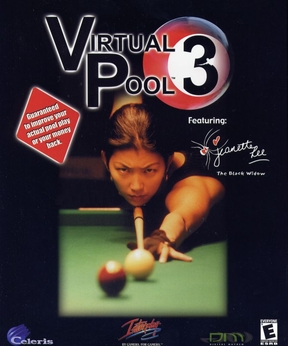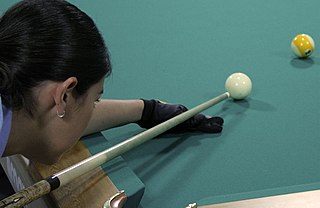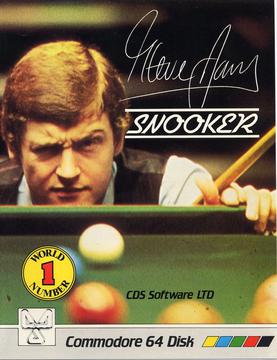
Cue sports are a wide variety of games of skill played with a cue, which is used to strike billiard balls and thereby cause them to move around a cloth-covered table bounded by elastic bumpers known as cushions. Cue sports are also collectively referred to as billiards, though this term has more specific connotations in some varieties of English.

Eight-ball is a discipline of pool played on a billiard table with six pockets, cue sticks, and sixteen billiard balls. The object balls include seven solid-colored balls numbered 1 through 7, seven striped balls numbered 9 through 15, and the black 8 ball. After the balls are scattered with a break shot, a player is assigned either the group of solid or striped balls once they have legally pocketed a ball from that group. The object of the game is to legally pocket the 8-ball in a "called" pocket, which can only be done after all of the balls from a player's assigned group have been cleared from the table.

Nine-ball is a discipline of the cue sport pool. The game's origins are traceable to the 1920s in the United States. It is played on a rectangular billiard table with pockets at each of the four corners and in the middle of each long side. Using a cue stick, players must strike the white cue ball to pocket nine colored billiard balls, hitting them in ascending numerical order. An individual game is won by the player pocketing the 9 ball. Matches are usually played as a race to a set number of racks, with the player who reaches the set number winning the match.

Snooker is a cue sport played on a rectangular billiards table covered with a green cloth called baize, with six pockets: one at each corner and one in the middle of each long side. First played by British Army officers stationed in India in the second half of the 19th century, the game is played with 22 balls, comprising a white cue ball, 15 red balls and 6 other balls—a yellow, green, brown, blue, pink and black—collectively called 'the colours'. Using a snooker cue, the individual players or teams take turns to strike the cue ball to pot other balls in a predefined sequence, accumulating points for each successful pot and for each foul committed by the opposing player or team. An individual frame of snooker is won by the player who has scored the most points, and a snooker match ends when a player wins a predetermined number of frames.

Straight pool, which is also called 14.1 continuous and 14.1 rack, is a cue sport in which two competing players attempt to pocket as many object balls as possible without playing a foul. The game was the primary version of pool played in professional competition until it was superseded by faster-playing games like nine-ball and eight-ball in the 1980s.
Golf billiards is a pocket billiards game usually played for money. Unlike the majority of such games, it allows more than two people to play without compromises or rule changes. The game borrows from the outdoor game of golf, which is historically related to the cue sports. It is usually played on 10-foot or 12-foot snooker tables as their size and structure are more appropriate. In 2006 the Billiard Congress of America commented it was more popular than snooker in the United States.

A billiard ball is a small, hard ball used in cue sports, such as carom billiards, pool, and snooker. The number, type, diameter, color, and pattern of the balls differ depending upon the specific game being played. Various particular ball properties such as hardness, friction coefficient, and resilience are important to accuracy.

Russian pyramid, also known as Russian billiards, is a form of billiards played on a large billiard table with narrow pockets. It is played across Russia and several former Soviet/Eastern Bloc countries. In the West, the game is known as pyramid billiards, or simply pyramid.

A billiard table or billiards table is a bounded table on which cue sports are played. In the modern era, all billiards tables provide a flat surface usually made of quarried slate, that is covered with cloth, and surrounded by vulcanized rubber cushions, with the whole thing elevated above the floor. More specific terms are used for specific sports, such as snooker table and pool table, and different-sized billiard balls are used on these table types. An obsolete term is billiard board, used in the 16th and 17th centuries.

Pool is a series of cue sports played on a billiard table. The table has six pockets along the rails, into which balls are shot. Of the many different pool games, the most popular include: eight-ball, blackball, nine-ball, ten-ball, seven-ball, straight pool, one-pocket, and bank pool. Eight-ball is the most frequently played discipline of pool, and it is often thought of as synonymous with "pool".
The following is a glossary of traditional English-language terms used in the three overarching cue sports disciplines: carom billiards referring to the various carom games played on a billiard table without pockets; pool, which denotes a host of games played on a table with six pockets; and snooker, played on a large pocket table, and which has a sport culture unto itself distinct from pool. There are also games such as English billiards that include aspects of multiple disciplines.

Virtual Pool 3 is a 3D, first-person sports video game that simulates various cue sports, developed and released for Windows and PlayStation by Celeris. The game features 15 pool disciplines, snooker, and two varieties of carom billiards.

Virtual Pool is a 3D, first-person sports simulation video game series with computer simulations of cue sports which was developed by Celeris. The games in the series simulate pool, snooker and carom billiards. The Virtual Pool series focuses on accurate simulation and improving the player's ability to play the sport in real life. Virtual Pool releases are sold with a money back guarantee to improve a player's external game.
Carom billiards and pool are two types of cue sports or billiards-family games, which as a general class are played with a stick called a cue which is used to strike billiard balls, moving them around a cloth-covered billiard table bounded by rubber cushions attached to the confining rails of the table.

World Snooker Championship 2007 is a sports video game developed by Blade Interactive and published by Sega for PlayStation 2, PlayStation Portable, Xbox 360 and PlayStation 3.

A cue stick is an item of sporting equipment essential to the games of pool, snooker and carom billiards. It is used to strike a ball, usually the cue ball. Cues are tapered sticks, typically about 57–59 inches long and usually between 16 and 21 ounces (450–600 g), with professionals gravitating toward a 19-ounce (540 g) average. Cues for carom tend toward the shorter range, though cue length is primarily a factor of player height and arm length. Most cues are made of wood, but occasionally the wood is covered or bonded with other materials including graphite, carbon fiber or fiberglass. An obsolete term for a cue, used from the 16th to early 19th centuries, is billiard stick.

Virtual Pool Hall is a sports simulation video game developed Celeris and published by Interplay Entertainment as an entry in the Virtual Pool franchise, an improvement and sequel to Virtual Pool 2 and PC sequel to Virtual Pool 64. The game was initially released on PC in December 1999. Pool Hall is the first game in the Virtual Pool series to have playable Snooker in addition to the regular pool gamemodes.

Steve Davis World Snooker is a sports simulation video game developed by Binary Design and published by CDS Software. It simulates different types of cue sports, specifically snooker, pool and billiards. Released under licence from 6-time Snooker World Champion, Steve Davis, it is a sequel to their 1984 game Steve Davis Snooker.

Steve Davis Snooker is a sports simulation video game developed and published by CDS Software in 1984. The budget release published by Blue Ribbon Software reached the top of the UK charts in May 1988. Steve Davis Snooker simulates the cue sport snooker. Released under licence from 6-time Snooker World Champion, Steve Davis.
Slosh is a cue sport played on a snooker table. The game features seven balls, coloured white, yellow, green, brown, blue, pink and black, with points being scored for pocketing or playing caroms and cannons off object balls. The game is played to a score of 100 points, or a length of 30 minutes. First played in the early 1900s, not much is known about the game's origins.
















